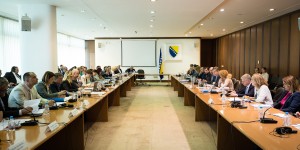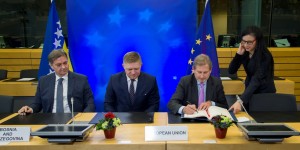Brussels, 17 December 2015
Representatives of the European Commission (Commission) on behalf of the European Union and of Bosnia and Herzegovina (BiH) met on 17 December 2015 in Brussels for the 1st Stabilisation and Association Committee meeting in the framework of the Stabilisation and Association Agreement (SAA) between the European Union and BiH. The meeting was opened by Ms Catherine Wendt, Acting Director for Western Balkans in the European Commission, and chaired by Ms Michela Matuella, Head of Unit for Albania and Bosnia and Herzegovina, and co-chaired by Mr. Edin Dilberović, Director of the BiH Directorate for European Integration. Ambassador Lars-Gunnar Wigemark, Head of the EU Delegation Sarajevo and EU Special Representative, and Ambassador Lidija Topić also took part in the meeting.
One week after the first meeting of the Stabilisation and Association Council between Bosnia and Herzegovina and the EU, this meeting marked the beginning of the implementation of the Stabilisation and Association Agreement (SAA) on technical level. It is an important step for the EU integration process of Bosnia and Herzegovina.
The Committee adopted Decision N°1 creating seven subcommittees and a special group on Public Administration Reform. The first cycle of subcommittee meetings will start in February 2016.
The meeting examined the progress made and remaining challenges in the country’s pre-accession process, also in the light of the Commission’s Bosnia and Herzegovina Report of November 2015. It welcomed in particular the new positive dynamic in the reform process in Bosnia and Herzegovina following the adoption of the Reform Agenda in July 2015 and its progressive implementation. Both sides agreed that negotiations on the SAA adaptation following the accession of Croatia to the EU should be resumed swiftly to find a mutually agreeable solution, in line with the principle of traditional trade. Once the EU and Bosnia and Herzegovina have signed and provisionally applied an agreement on the adaptation of trade concessions in the Stabilisation and Association Agreement, the autonomous trade measures, which will be suspended as from 1 January 2016, will be re-established. Furthermore it was highlighted that the country needs to establish urgently an effective and efficient coordination mechanism on EU matters.
The meeting underlined the importance of developing a solid countrywide, politically supported and financially sustainable strategic framework on Public Administration Reform (PAR) as well as a linked public financial management reform programme. The Special group on PAR will serve as the platform to enhance the political and technical dialogue on PAR related issues. The inaugural meeting is planned for March 2016.
The EU delegation to the meeting (EU delegation) welcomed the adoption of the Judicial Sector Reform Strategy as well as the accompanying Action Plan and noted the first steps of Bosnia and Herzegovina to begin with the implementation. It reiterated that the overall implementation of the National War Crimes Strategy including an effective and timely processing of war crimes cases remains an issue of priority.
Other important Rule of law areas discussed were the fight against corruption and against organised crime where Bosnia and Herzegovina made some progress but still needs to build up a credible track record of effective investigations, prosecutions and final convictions, including at high-level.
The EU delegation noted the recent adoption of Action plans by the BiH Council of Ministers for implementation of the Sejdić/Finci and Zornić rulings of the European Court for Human Rights and insisted on concrete steps towards a solution.
The EU delegation urged Bosnia and Herzegovina to increase its efforts in revising the anti-discrimination legal framework and to develop a countrywide strategy in line with European standards. Amongst other issues, Bosnia and Herzegovina is expected to abolish ethnic segregation through the “two schools under one roof” practice, to effectively address cases of discrimination targeting the LGBTI community and human rights defenders, and to reverse the recent trend of backsliding on freedom of expression. On Roma the EU delegation welcomed some progress in addressing the housing needs and the issue of civil registration, but called to step up efforts in improving access in the areas of education, employment and health.
The EU delegation congratulated Bosnia and Herzegovina on the improved consensus on economic policy priorities and appreciated the economic resilience, realising positive growth despite the damages caused by floods and draught. The EU delegation also noted the positive momentum following the adoption of the Global Framework for Fiscal Policies and Balances 2016-2018, whereas the implementation of the Economic Reform Programme still needs a much more coherent and coordinated approach between entities within a countrywide sectoral policy framework.
On the population and housing census, the EU delegation, expressed serious concerns over the lack of progress in implementing the remaining operational steps leading to the final dissemination of the census results.
The EU delegation informed about the recently adopted IPA 2015 Annual Action Programme which provides some €160 million as well as over €40 million for further flood recovery measures, covering the 2014-2017 period. The establishment of a coordination mechanism on EU matters and countrywide sector strategies in many areas remain key requirements for Bosnia and Herzegovina to increase and fully benefit from IPA funding.
The meeting also addressed questions related to visa policy, border management, asylum and migration, where Bosnia and Herzegovina still has to strengthen its capacities.
The EU delegation emphasized the need for Bosnia and Herzegovina to remove all unnecessary technical, legal and administrative barriers to the free movement of goods within the country and to adopt urgently a countrywide Strategy for Quality Infrastructure as well as a countrywide SME policy framework. It stressed again that the definition of independent small breweries benefitting from lower excise duty rates is not in line with the EU acquis thus creating a potential trade barrier. On public procurement, the EU delegation welcomed the entry into force of the legal framework and asked for the adoption of remaining secondary legislation. In the area of State aids the EU delegation noted progress in alignment with the EU acquis and was satisfied with the work of the State Aid Council. However, the competition law needs to be brought in line with the EU acquis.
The EU delegation welcomed the adoption of an amended Labour Law by the Federation entity and called for consultations with social partners when reforming labour legislation in Bosnia and Herzegovina. It urged the country to facilitate access to the labour market, especially for the youth and women, to address high unemployment and to substantially improve the social dialogue. A strategic approach to employment and social protection would help the country and its economy to modernise and create sustainable growth.
In the area of Information Society and Media, the EU delegation called Bosnia and Herzegovina to ensure the financial stability and political independence of the public broadcasting operator. The appointment of the Director General of the independent Community Regulatory Agency needs to be done in, accordance with the law and without political interferences.
The EU delegation welcomed the engagement of Bosnia and Herzegovina up to now as regards the Connectivity agenda, including the adoption of a transport policy framework 2015-2030, but stressed the need to commence without delay work on a countrywide transport strategy as well as on the so-called “soft measures” in order to present well-prepared projects and measures in this area to the WB6 summit in Paris in summer 2016. In the area of energy which is also part of the connectivity agenda, Bosnia and Herzegovina still needs to develop a countrywide strategy and to urgently take steps to continue and complete the recently resumed work on the transposition of the 3rd Energy package for gas and electricity. This includes in particular legislation on natural gas where according to the recent decision of the Council of Ministers of the Energy Community issuing some sanctions, the country still remains in persistent and serious breach of its commitments under the Energy Community Treaty.
The EU delegation reiterated the country’s need to set up a harmonised legal framework, to establish a countrywide strategy that will address in particular waste management, water quality and nature protection, and to strengthen its administrative capacity and monitoring systems. It also underlined that investments in hydropower projects need to ensure that Environmental Impact Assessment, water legislation and nature protection obligations are respected. Following the adoption of the UNFCCC Climate Agreement in Paris a few days ago, Bosnia and Herzegovina has now to begin with the implementation of its national contribution. It has also to set up a harmonised legal framework and a countrywide strategy addressing climate action.
The EU delegation noted that in the field of agricultural and rural development Bosnia and Herzegovina still needs to establish a multi-annual rural development strategy, action plan, multi-annual budgets as well as the national structures for pre-accession assistance to the agricultural sector through IPARD. The EU delegation welcomed the progress in the area of veterinary, phyto-sanitary and food safety matters which allows Bosnia and Herzegovina to export dairy products and potatoes to the EU, and encouraged it to continue with the modernisation and strengthening of capacities in these areas.



